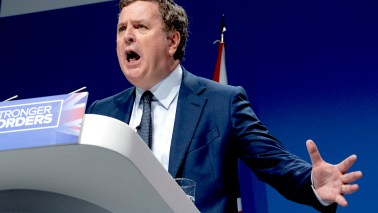For anyone old enough to remember the 70s, the strikes that have broken out in the past few weeks are a reminder of the industrial strife that was a regular feature of life back then.
As a child at the time, power cuts and picket lines seemed quite fun. They were not so amusing, of course, for the adults.
Today’s union activism might not quite add up to a winter of discontent, but it is certainly a Christmas of irritation.
It’s easy to blame it all on the swaggering rabble-rouser union leaders who have crawled out of the woodwork. But those union barons are tapping into a deep sense of unfairness that lies behind the current wave of unrest and that also contributed to the Brexit vote.
Namely, that business leaders – many of whom were pro-Remain – are remote from, if not hostile to, the interests of ordinary people: and that they are vastly overpaid.
It is the perception that the system is working for them by delivering ever-richer rewards but letting the rest of us down. It rankles for many people – and not just at the bottom, but plenty in the middle classes too – that rewards for the business elite have spiralled every upwards while incomes in most households have stagnated at best.
Pay at the top is utterly detached from the experience of a typical, run-of-the-mill employee. It is also far removed from highly-qualified professionals whose payslips are well above average, in the high five or low six figures.
The average FTSE 100 chief executive received £5.5 million in 2015. They have been impervious to the financial crisis and the economic ills that came in its wake. Packages in the FTSE 100 have seen a 32 per cent rise since 2010. The typical CEO now earns 183 times as much as the median pay of a full-time British employee, taking only three days to make what they earn in an entire year.
Regardless of whether they ‘deserve’ such sums, pay on this scale doesn’t help the image of business in an already disillusioned populace.
The emergence of pantomime bogey-man figures like Philip Green, who is wallowing in his billionaire Monaco residence while BHS workers fret about their pensions, hasn’t helped either. Fairly or not, many members of the public don’t distinguish between him and the FTSE 100 business establishment.
The fact workers are revolting again is not entirely due to bolshy unions. There is unease about non-unionised companies like Amazon, where there has been an outcry about one low-waged worker living in a tent in the midst of the Scottish winter.
I’m an Amazon addict, but even I feel concerned about a company where employees are having to pay a £10 bus fare to work out of wages that start at £7.35 an hour.
There are also increasing concerns about zero hours contracts and the so-called ‘gig-economy’, which, depending on one’s point of view, offers flexibility or deprives people of hard-won employment rights.
There’s no need to be a raving Corbynista to wonder whether the pendulum may have swung too far against ordinary, hard-working families – the type politicians want to woo.
Not when the FTSE is only trading at about the same level as it was 18 years ago, but executive pay over the period has more than trebled. And not when there is an irrational, unhealthy and growing gap between CEO pay and that of employees. Those are not my words, by the way, they are Theresa May’s.
In in her pitch to become Prime Minister in the summer, she spelled out why the Tories, as the party of business and enterprise, need to get tough on corporate irresponsibility.
Chris Philp, the Tory MP for Croydon South produced a thoughtful paper in the autumn on restoring responsible ownership of companies and controlling executive pay, backed by leading investor Neil Woodford and former City Minister Lord Myners. Among his proposals are forcing companies to publish the ratio of CEO pay to that of the median worker, annual binding votes on executive pay, and a shareholder committee whose duties would include scrutiny of the bosses’ rewards.
It isn’t just lefties who should be concerned about excessive boardroom pay.
The sums handed out mean it’s Christmas every day for CEOs. That’s not capitalism, it’s a racket. Allowing it to continue unchecked would be crazy, not least because it presents militant unions with a juicy open goal.
Ruth Sunderland is City Features Editor of the Daily Mail






Comments